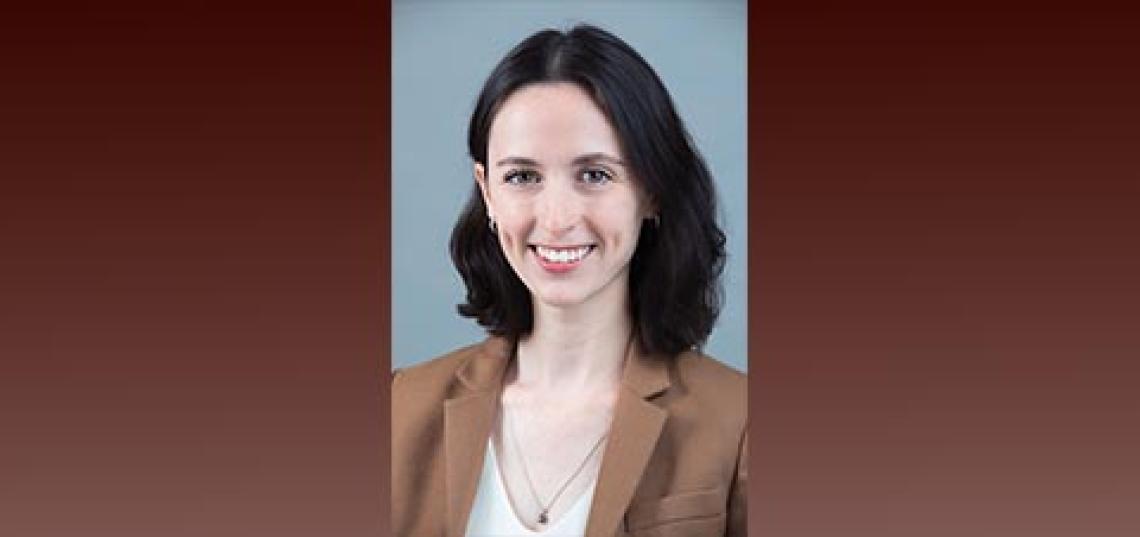
The National Institutes of Health (NIH) and the National Cancer Institute (NCI) have named SC&I Ph.D. candidate Liesl Broadbridge as one of 23 recipients nationwide for the 2024 Predoctoral to Postdoctoral Fellow Transition Award (F99/K00) cohort.
A board-certified genetic counselor and fourth-year Ph.D. candidate, Broadbridge was awarded the prestigious grant for her research proposal “Comparing post-test genetic counseling with and without pre-test counseling: The evolving landscape for optimizing cancer care.”
A career development award, the grant, “supports outstanding Ph.D. and other Research Doctoral candidates complete their dissertation research training (F99 phase) and transition in a timely manner to mentored, cancer-focused postdoctoral career development research positions (K00 phase)” according to the National Cancer Institute.
Unlike other NIH/NCI fellowships, the NCI allows only one applicant per institution or university. Broadbridge submitted her proposal for an internal competition at Rutgers in August of 2023 and was selected by the University to apply for the fellowship as the Rutgers representative. She applied for the fellowship award with co-sponsors Kathryn Greene (PhD advisor, SC&I Professor of Communication) and Paul Duberstein (Chair of the Department of Health Behavior, Society, and Policy, Rutgers School of Public Health) and a team of Rutgers mentors.
Her advisor, Dr. Kathryn Greene said of the news, “I am thrilled for Liesl, SC&I, and our Rutgers research program. Her study holds promise for advancing health communication research in genetic counseling. The dissemination and translation of her findings have the potential to improve genetic counseling training and, ultimately, the lives of patients. The additional training Liesl will receive as part of this fellowship will exponentially increase her impact as an independent, grant-funded health communication researcher.”
The overarching goal of Broadbridge’s project is to explore how changing models of care in genetic counseling for hereditary breast and ovarian cancer affect client experiences and outcomes.
The overarching goal of Broadbridge’s project is to explore how changing models of care in genetic counseling for hereditary breast and ovarian cancer affect client experiences and outcomes. Specifically, the F99 project will characterize the communication and outcomes of genetic counseling that occurs both before and after genetic testing compared with genetic counseling that occurs after testing only.
While effective cancer genetic counseling is critical, Broadbridge notes that a growing demand for hereditary breast and ovarian cancer genetic testing and counseling, coupled with expanding eligibility criteria, has resulted in a dramatic increase in the number of people who qualify for testing. This expansion has far outpaced the number of genetic counselors qualified to provide these services.
“Because of this increase,” Broadbridge explains, “genetic counselors are increasingly meeting patients only after test results are available (i.e., post-test counseling). This is a significant shift from the traditional model of seeing patients for both pre- and post-test genetic counseling. Without pre-test counseling, there are fewer points of clinical contact to establish a therapeutic relationship, and thus the relationship may be weaker when post-test counseling is not preceded by pre-test counseling.”
This potential decrease in patient-provider relationship quality matters for clinical care, Broadbridge adds, “because the strength of the patient-counselor relationship is associated with better psychological outcomes, including better quality of life, satisfaction with care, decreased symptoms of depression, and potentially less decisional regret.”
While effective cancer genetic counseling is critical, Broadbridge notes that a growing demand for hereditary breast and ovarian cancer genetic testing and counseling, coupled with expanding eligibility criteria, has resulted in a dramatic increase in the number of people who qualify for testing. This expansion has far outpaced the number of genetic counselors qualified to provide these services.
Broadbridge, whose long-term research goal is “to sustainably improve hereditary cancer genetic counseling to meet the needs of patients and adapt to the changing landscape of precision medicine,” says the research she will conduct for this project will build on her doctoral research thus far, which has focused on how effective clinician communication affects psychological adaptation to cancer.
After receiving notice of the award, Broadbridge told us she is, “incredibly honored to have been selected for this fellowship. It is humbling to know that the Rutgers research community and the NCI believed in my science and career aspirations. I am excited to carry out the proposed research during my doctoral dissertation at Rutgers and translate those findings during my K00 postdoc phase.”
Learn more about the Ph.D. Program at the Rutgers School of Communication and Information on the website.
